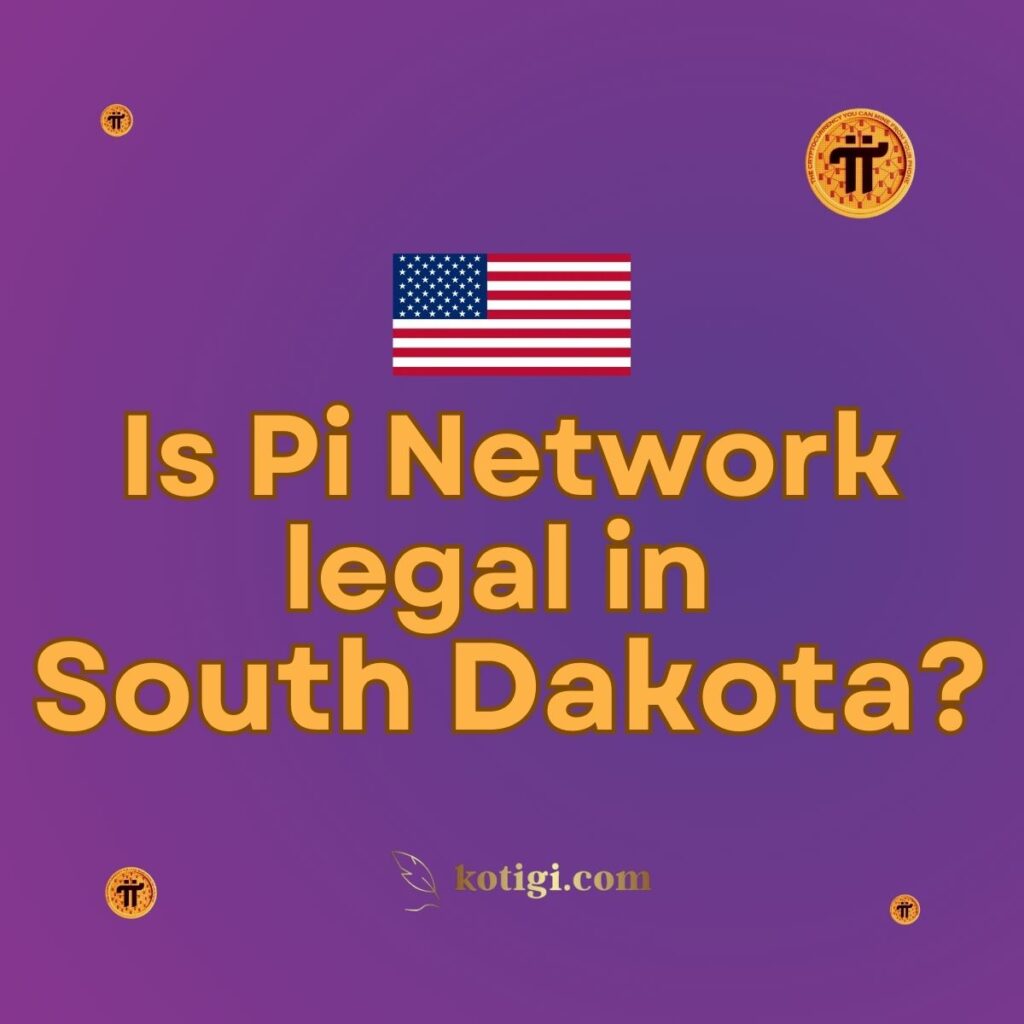
Is Pi Network legal in South Dakota?
Yes, Pi Network is legal for residents of South Dakota. Users can mine and use Pi tokens without facing specific restrictions, but they should remain informed about evolving cryptocurrency regulations and compliance measures to ensure a secure experience.
Introduction
Pi Network has emerged as an innovative platform that enables users to mine cryptocurrency directly from their mobile devices. This approach democratizes access to cryptocurrency, making it available to individuals without the need for expensive hardware. However, as with any new technology, questions regarding its legal status arise, especially within varying state laws across the United States. In South Dakota, understanding the legality of Pi Network is essential for prospective users. This article aims to provide a detailed overview of the legal considerations, compliance requirements, and engagement opportunities related to Pi Network in South Dakota.
1. Overview of Pi Network and Its Status in South Dakota
1.1 What is Pi Network?
Pi Network is a mobile-based cryptocurrency platform launched in 2019, designed to allow users to mine Pi coins using their smartphones. Unlike traditional mining, which often requires costly hardware and significant energy consumption, Pi Network operates on a unique algorithm that enables users to mine coins by simply using the app. This feature makes cryptocurrency more accessible to a broader audience.
1.2 Current Popularity of Cryptocurrencies in South Dakota
Cryptocurrency interest has surged in South Dakota, mirroring national trends. With growing awareness of blockchain technology, more residents are exploring various digital currencies. Local discussions on cryptocurrency are becoming commonplace, reflecting an increasing acceptance of digital assets in both personal and business contexts.
1.3 Legal Framework for Cryptocurrencies
Currently, South Dakota adopts a federal approach to cryptocurrency regulations. The state does not have specific laws addressing cryptocurrency but follows federal guidelines, which provide a framework for individuals engaging with digital currencies. This leniency allows residents to explore platforms like Pi Network without facing immediate legal barriers.
1.4 Accessibility of Pi Network in South Dakota
Residents can easily access Pi Network by downloading the app from the App Store or Google Play Store. There are no legal barriers preventing South Dakotans from engaging with the platform, making it a viable option for anyone interested in exploring cryptocurrency mining.
2. Legal Considerations for Pi Network Users
2.1 Absence of Specific State Cryptocurrency Laws
South Dakota has not enacted specific laws targeting cryptocurrencies, which creates a relatively open environment for users. This absence of state regulations means that residents can engage with Pi Network freely, without the fear of violating local laws.
2.2 Federal Compliance Regulations
While South Dakota’s legal landscape is favorable, users must adhere to federal laws governing cryptocurrencies. This includes regulations from the Securities and Exchange Commission (SEC) and the Internal Revenue Service (IRS). Understanding these regulations ensures that users engage with Pi Network responsibly.
2.3 Importance of Privacy and Data Protection
As Pi Network requires users to provide personal information during the KYC (Know Your Customer) process, it is crucial for residents to understand how their data will be handled. Users should read the platform’s privacy policy to know what data is collected and how it is protected. Taking these precautions helps safeguard personal information against potential data breaches.
2.4 Future Legislative Changes
The landscape of cryptocurrency regulations is dynamic. Users should remain vigilant about any legislative changes at both state and federal levels that could impact their engagement with Pi Network. Being proactive can help users adapt quickly to new regulations.
2.5 Token Legitimacy Verification
Although Pi tokens are not currently traded on public exchanges, users should be cautious about the legitimacy of their tokens. Conducting thorough research and staying updated on announcements regarding token exchanges will help users assess the future value and viability of their investments.
3. Compliance Requirements for South Dakota Users
3.1 Know Your Customer (KYC) Compliance
To enhance security and reduce fraud, Pi Network implements a KYC process that requires users to verify their identities. This step is crucial for protecting the platform and its users from illicit activities. South Dakota residents should ensure they complete the KYC process to fully engage with the platform.
3.2 Record-Keeping for Future Tax Obligations
While Pi tokens may not have immediate taxable value, maintaining accurate records of mining activities is essential. Should Pi tokens become valuable in the future, users will need detailed records for tax reporting purposes. Keeping track of transactions and earnings will facilitate compliance with tax obligations.
3.3 Awareness of IRS Guidelines
The IRS treats cryptocurrencies as property for tax purposes, meaning any capital gains or earnings from cryptocurrency activities may be subject to taxation. South Dakota users should familiarize themselves with IRS guidelines to ensure they meet all tax obligations related to their Pi Network activities.
3.4 Ensuring Account Security
To protect personal information, users should adopt strong security practices, such as creating robust passwords and enabling two-factor authentication. These measures enhance the security of Pi Network accounts and help prevent unauthorized access.
4. Engaging with Pi Network in South Dakota
4.1 Community Involvement Opportunities
Joining local cryptocurrency communities or online forums can provide South Dakota residents with valuable insights and support. Engaging with like-minded individuals can enhance their understanding of Pi Network and the broader cryptocurrency landscape.
4.2 Educational Events and Workshops
Hosting or attending educational events focused on blockchain technology and Pi Network can promote awareness and understanding. Workshops can help demystify the complexities of cryptocurrency, encouraging more individuals to participate in mining and other activities.
4.3 Collaboration with Local Businesses
Local businesses can play a significant role in promoting Pi Network. By accepting Pi tokens for goods and services, businesses can create a practical use case for the cryptocurrency, thereby increasing its adoption within the community.
4.4 Leveraging State-Level Blockchain Initiatives
South Dakota’s interest in blockchain technology opens doors for Pi Network to engage in state-sponsored initiatives. By participating in these programs, Pi Network can enhance its visibility and potentially expand its user base in the state.
5. Current and Future Utility of Pi Tokens
5.1 Anticipated Use Cases for Pi Tokens
While Pi tokens are not yet exchangeable, users should consider their potential future applications. Possible use cases include transactions, access to services within the Pi Network ecosystem, and participation in decentralized applications (dApps) once the network matures.
5.2 Importance of Market Listing
If Pi tokens gain traction and are listed on cryptocurrency exchanges, it could provide users with a tangible asset they can trade or utilize. Staying informed about potential exchange listings is critical for users looking to maximize the value of their tokens.
5.3 Speculative Nature of Tokens
Users should approach Pi tokens with caution, treating them as speculative assets until their market value is established. It’s essential to conduct thorough research and avoid making impulsive investment decisions based on speculation.
5.4 Role of Community Engagement in Token Value
The future success of Pi tokens will heavily depend on community engagement and active participation in the platform. A robust user community can drive demand and support the long-term viability of Pi tokens.
6. Legal Implications of Cryptocurrency Transactions
6.1 Federal Standards for Crypto Transactions
Federal laws govern cryptocurrency transactions in the U.S., affecting how South Dakota users interact with platforms like Pi Network. Understanding these standards will help users engage responsibly with the platform.
6.2 Implications of State-Level Regulations
Though South Dakota lacks stringent cryptocurrency laws, users should remain vigilant about any regulatory changes that could impact their legal standing. Keeping abreast of both federal and state developments is crucial.
6.3 Tax Obligations for Cryptocurrency Activities
Users should prepare for potential tax implications associated with cryptocurrency holdings. Keeping comprehensive records of mining activities and transactions will be invaluable for future tax compliance.
6.4 Consumer Protection Regulations
Federal consumer protection laws apply to digital currencies, ensuring that users have rights when engaging in cryptocurrency transactions. South Dakota residents should familiarize themselves with these protections to safeguard their interests.
7. Future Outlook for Cryptocurrency Regulations
7.1 Emerging Federal Legislation
The landscape of cryptocurrency regulations is continuously evolving at the federal level. South Dakota residents should stay informed about proposed laws that could affect the use of Pi Network and other cryptocurrencies in the state.
7.2 Potential for State-Level Regulatory Developments
As the cryptocurrency market matures, South Dakota may choose to implement specific regulations addressing digital currencies. Users should be prepared to adapt to new compliance requirements as they arise.
7.3 Industry Standards and Best Practices
As the cryptocurrency industry develops, platforms like Pi Network will likely adopt industry best practices, which could affect user guidelines and engagement. Staying informed about these changes will help users navigate the evolving landscape.
7.4 International Regulatory Trends
Global regulatory developments can influence local practices. South Dakota users should be aware of international trends in cryptocurrency regulations, as they may impact the broader market and the use of platforms like Pi Network.
8. Opportunities for Pi Network’s Expansion in South Dakota
8.1 Collaborating with Local Tech Communities
Forming partnerships with local technology organizations can significantly enhance Pi Network’s visibility in South Dakota. These collaborations can lead to increased user adoption and promote understanding of the platform’s benefits.
8.2 Participation in Blockchain Initiatives
South Dakota’s interest in blockchain technology provides a unique opportunity for Pi Network to engage in state initiatives, fostering growth and acceptance of the platform. By collaborating with government entities, Pi Network can position itself as a leader in the local crypto space.
8.3 Hosting Educational Outreach Programs
Engaging local communities through educational outreach programs can help demystify blockchain technology and promote Pi Network’s benefits. Such initiatives can increase user interest and encourage participation in cryptocurrency mining.
8.4 Engaging with Local Government
Building relationships with local government agencies can facilitate discussions around the potential of blockchain technology. These engagements can help shape favorable policies for cryptocurrency platforms like Pi Network, ultimately benefiting users.
8.5 Promoting Local User Events
Organizing meetups and events specifically for Pi Network users can help foster a sense of community in South Dakota. These gatherings provide networking opportunities and offer valuable insights for users on how to maximize their experience with the platform.
Conclusion
Pi Network is legal for users in South Dakota, allowing them to engage with the platform freely. While the regulatory landscape is favorable, it is essential for users to stay informed about potential changes at both state and federal levels. By prioritizing compliance, engaging with local initiatives, and safeguarding personal data, residents can enjoy a secure and rewarding experience with Pi Network.
Key Takeaways
- Legality Confirmed: Pi Network is legal in South Dakota, allowing users to mine and utilize the platform without facing specific restrictions.
- Stay Informed on Compliance: Users should be aware of federal regulations and maintain records for potential future tax implications.
- Potential Token Utility: Although currently not exchangeable, Pi tokens may have future value and use cases as the platform develops.
- Prioritize Data Security: Understanding Pi Network’s privacy policies and implementing security measures will protect personal information.
- Engagement Opportunities: Local involvement through events, partnerships, and community initiatives can significantly enhance Pi Network’s visibility and adoption in South Dakota.




